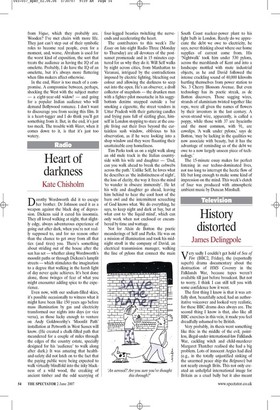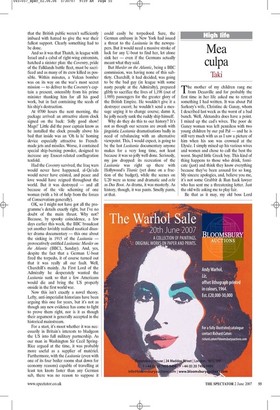History distorted
James Delingpole erysadly I couldn't get hold of Sea of Fire (BBC2, Friday), the (reportedly superb) drama documentary about the destruction of HMS Coventry in the Falklands War, because tapes weren't available till just before broadcast. But not to worry. I think I can still tell you with some confidence how it went.
The first thing I know is that it was artfully shot, beautifully acted, had an authoritative voiceover and looked very realistic, for these BBC drama docs always are. The second thing I know is that, also like all BBC exercises in this vein, it made you feel dreadfully ashamed to be British.
Very probably, its thesis went something like this: in the middle of the evil, pointless, illegal-under-international-law Falklands War, cackling witch and child-murderer Margaret Thatcher realised she had a big problem. Lots of innocent Argies had died (e.g., in the totally unjustified sinking of the unarmed peace ship the Belgrano) but not nearly enough Brits. This not only created an unhelpful international image for Britain as a cruel bully but it also meant that the British public weren't sufficiently imbued with hatred to give the war their fullest support. Clearly something had to be done.
And so it was that Thatch, in league with Israel and a cabal of right-wing extremists, hatched a sinister plan: the Coventry, pride of the Falklands battle fleet, must be sacrificed and as many of its crew killed as possible. Within minutes, a Vulcan bomber was on its way on the war's most secret mission — to deliver to the Covenny's captain a present, ostensibly from his prime minister thanking him for all his good work, but in fact containing the seeds of his ship's destruction.
At 0700 hours the next morning, the package arrived: an attractive alarm clock signed on the back: 'Jolly good show! Mags!' Little did the poor captain know as he installed the clock proudly above his bed that inside was an 'Oh la la' homing device especially attractive to Frenchmade jets and missiles. Worse, it contained special ship-burning powder, designed to increase any Exocet-related conflagration tenfold.
Had the Coventry survived, the Iraq wars would never have happened, al-Qa'eda would never have existed, and peace and love would have reigned throughout the world. But it was destroyed — and all because of the vile scheming of one woman (with a bit of help from the forces of Conservatism generally).
OK, so I might not have got all the programme's details exactly right, but I've no doubt of the main thrust. Why not? Because, by spooky coincidence, a few days earlier this week, the BBC broadcast yet another lavishly realised nautical disaster drama documentary — this one about the sinking in 1915 of the Lusitania — provocatively entitled Lusitania: Murder on the Atlantic (BBC1, Sunday). And, yes, despite the fact that a German U-boat fired the torpedo, it of course turned out that it was really all our fault. Well, Churchill's mainly. As First Lord of the Admiralty he desperately wanted the Lusitania sunk so that a few Americans would die and bring the US properly onside in the first world war.
Now this isn't exactly a novel theory. Lefty, anti-imperialist historians have been arguing this one for years, but it's not as though any new evidence has come to light to prove them right, nor is it as though their argument is generally accepted in the historical mainstream.
For a start, it's moot whether it was necessarily in Britain's interests to bludgeon the US into full military partnership. As our man in Washington Sir Cecil SpringRice argued at the time, it was probably more useful as a supplier of materiel. Furthermore, with the Lusitania (even with one of its four boiler rooms shut down for economy reasons) capable of travelling at least ten knots faster than any German sub, there was no reason to suppose it could easily be torpedoed. Sure, the German embassy in New York had issued a threat to the Lusitania in the newspapers. But it would need a massive stroke of luck for any U-boat to find her, let alone sink her — even if the Germans actually meant what they said.
But Murder on the Atlantic, being a BBC commission, was having none of this subtlety. Churchill, it had decided, was going to be the bad guy (in league with some nasty people at the Admiralty), prepared glibly to sacrifice the lives of 1,198 (out of 1.989) passengers for the greater glory of the British Empire. He wouldn't give it a destroyer escort; he wouldn't send a message urging it to change course; damn it, he jolly nearly sank the ruddy ship himself.
Why do they do this to our history? It's not as though our screens are awash with jingoistic Lusitania dramatisations badly in need of rebalancing with an alternative viewpoint. This, I would expect, is going to be the last Lusitania documentary anyone makes for a very long time, not least because it was so jolly well done. Seriously, my jaw dropped: its recreation of the Lusitania was right up there with Hollywood's Titanic (yet done on a fraction of the budget), while the scenes on U20 were as tense and dramatic and echt as Das Boot. As drama, it was masterly. As history, though, it was pants. Smelly pants, at that.





















































 Previous page
Previous page